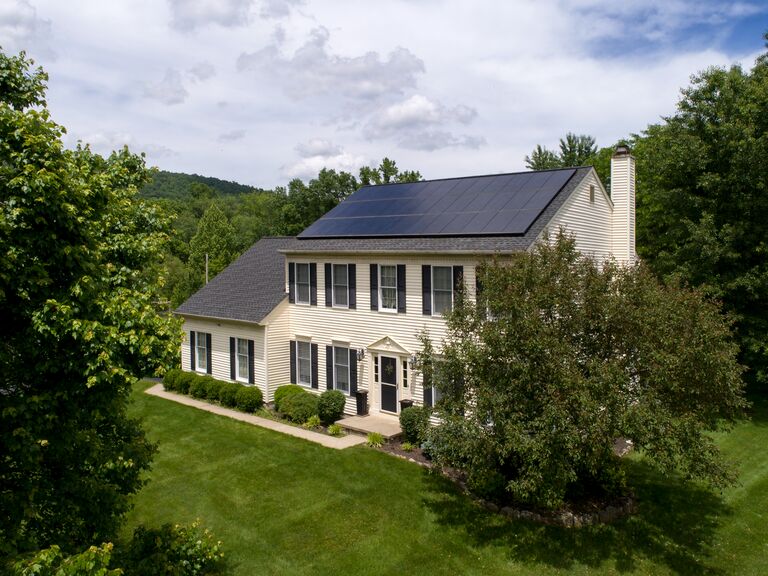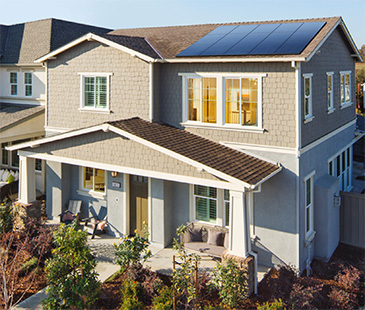
Clouds gather. The sky grows dark. A solar homeowner may naturally wonder: How much energy can my solar system generate during a cloudy day?
While of course solar panels need sunlight to produce energy, it's important to learn how cloudy conditions can affect the efficiency of solar energy generation and how factors such as partial shade can impact your solar system power output.
Yes, solar panels still work in cloudy weather — they just might generate less power, depending upon the quality and efficiency of your panels.
Does a cloudy day affect solar energy generation?
Anyone who has gotten sunburned on a cloudy day knows that solar radiation penetrates clouds. For that same reason, solar panels can still produce electricity on cloudy days. But depending on the cloud cover and the quality of the solar panels, efficiency can drop to anywhere from 10 to 25 percent of the energy output seen on a sunny day.
Fortunately, SunPower® solar panels, with a record-breaking efficiency of more than 22 percent (highest efficiency panels commercially available*Based on search of datasheet values from websites of Top 20 manufacturers per IHS, as of January 2019.), use cells with a unique one-of-a-kind design that capture a broader range of the sun's light — including red and blue wavelengths. They make more energy than conventional panels on a cloudy day, making them a good choice for cloudy climates or if trees partially shade your roof during certain times of day. We also design into our cells a "backside mirror" that uses a thin layer of aluminum that bounces some of the light photons that are not absorbed on their first pass through a cell back into the cell to have a second chance for absorption. This results in greater output of electrons from the same input of light.
What do solar panels use to generate electricity?
Solar PV panels work by converting sunlight to direct current (DC) and then an inverter turns that into alternating current (AC), which is the type of power most houses run on. If it's so sunny that your solar system produces far more electricity than you need, that AC power then goes back to the grid to be used by the utility, which in many areas offers the homeowner a credit via net metering.
Net metering policies, which vary by state, generally give you credit for excess power you produce, and you can draw on that credit at night or when your system produces less due to cloudy weather.
3 key facts about solar panels and cloudy weather
Here are a few important things to remember:
Solar power can work well in typically cloudy, cold locations. New York. San Francisco. Milwaukee. Boston. Seattle. All of those cities can experience quite inclement weather, from rain and fog to blizzards, yet all of them top the list of U.S. cities that see the highest level of savings thanks to solar installations. The cost of electricity – not the number of cloudy or cold days – is the biggest factor in determining whether solar saves people money on their electric bill. In New York and San Francisco, for example, the high cost of electricity makes solar installation worth the investment for home and business owners.
Solar doesn't need hot weather to generate electricity. Solar panels actually work best in places that are sunny and cold. When panels get above about 77 degrees Fahrenheit, they tend to work less efficiently. That doesn't mean they won't work in traditionally hot places such as Phoenix (which is No. 6 on the list of cities with the greatest solar savings). Again, electricity costs – not the weather – play a bigger role in how solar PV can save homeowners money.
While partial shading — whether it be from natural or other sources — can decrease the amount of solar energy your system is generating, solar systems are engineered to prevent the effects of shading from causing all energy production to stop. If, say, 20 percent of the solar PV panels are shaded by a tree limb, only 20 percent of the system's energy production is temporarily diminished – but no more. Again, qualified installers know how to design your system so shading issues won't be a problem. That's why it's important to work with a qualified solar panel installer. SunPower handpicks dealers nationwide to exclusively sell its solar technology. These are locally based businesses with expertise in your community's weather and installation rules and regulations, so they're the best sources of knowledge on how solar will work on your home.
It doesn't hurt to keep in mind that Germany — a leader in renewable energy that's famous for its lack of sunlight – accounts for about 25 percent of the world's solar power output and achieved its strongest growth in half a decade last year, according to a recent Greentech Media article. That's good evidence that going solar is about saving on your energy costs and helping the planet — not about the weather.
The bottom line is that a cloudy day shouldn't darken anyone's view toward considering switching to solar power.

